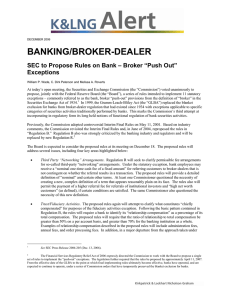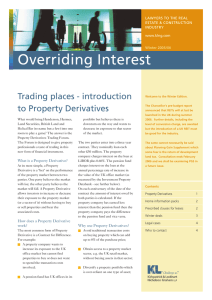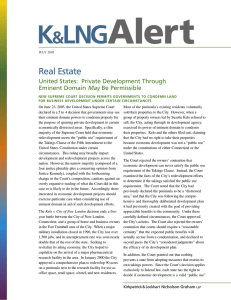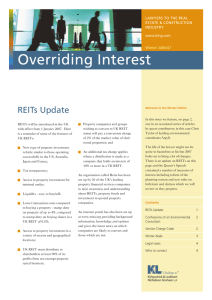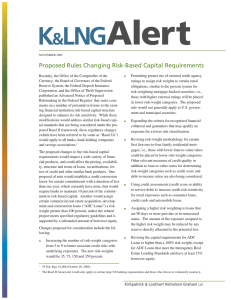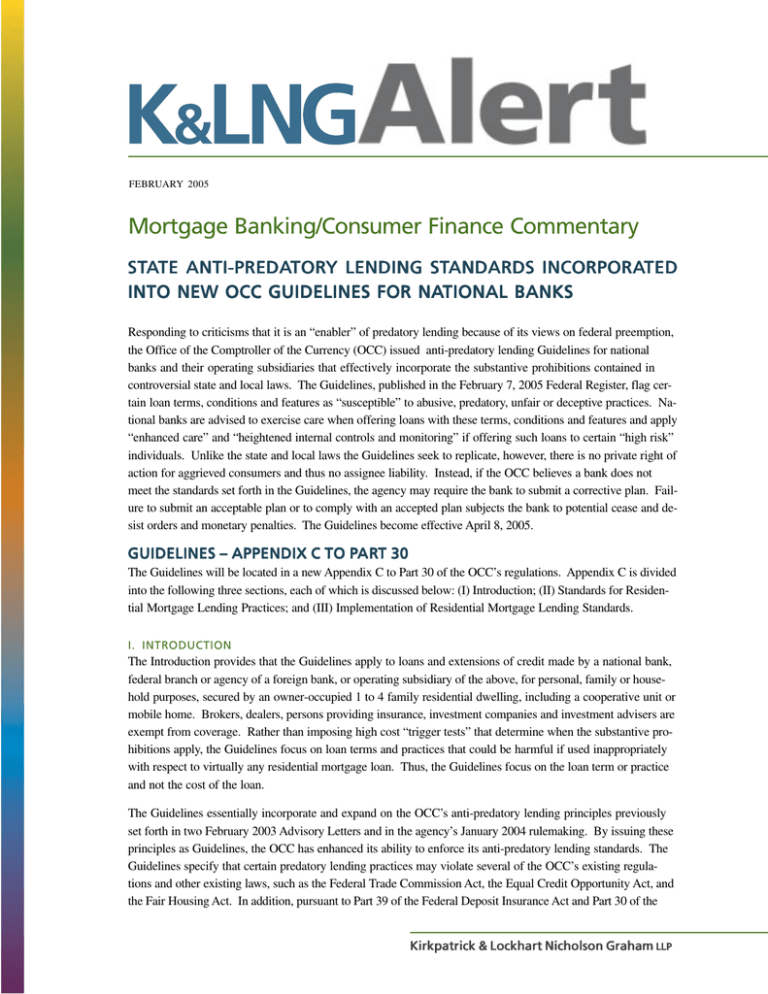
FEBRUARY 2005
Mortgage Banking/Consumer Finance Commentary
ST
ATE ANTI-PREDA
TOR
Y LENDING ST
ANDARDS INCORPORA
TED
STA
ANTI-PREDATOR
TORY
STANDARDS
INCORPORATED
INTO NEW OCC GUIDELINES FOR NA
TIONAL BANKS
NATIONAL
Responding to criticisms that it is an “enabler” of predatory lending because of its views on federal preemption,
the Office of the Comptroller of the Currency (OCC) issued anti-predatory lending Guidelines for national
banks and their operating subsidiaries that effectively incorporate the substantive prohibitions contained in
controversial state and local laws. The Guidelines, published in the February 7, 2005 Federal Register, flag certain loan terms, conditions and features as “susceptible” to abusive, predatory, unfair or deceptive practices. National banks are advised to exercise care when offering loans with these terms, conditions and features and apply
“enhanced care” and “heightened internal controls and monitoring” if offering such loans to certain “high risk”
individuals. Unlike the state and local laws the Guidelines seek to replicate, however, there is no private right of
action for aggrieved consumers and thus no assignee liability. Instead, if the OCC believes a bank does not
meet the standards set forth in the Guidelines, the agency may require the bank to submit a corrective plan. Failure to submit an acceptable plan or to comply with an accepted plan subjects the bank to potential cease and desist orders and monetary penalties. The Guidelines become effective April 8, 2005.
GUIDELINES – APPENDIX C TO P
AR
T 30
PAR
ART
The Guidelines will be located in a new Appendix C to Part 30 of the OCC’s regulations. Appendix C is divided
into the following three sections, each of which is discussed below: (I) Introduction; (II) Standards for Residential Mortgage Lending Practices; and (III) Implementation of Residential Mortgage Lending Standards.
I. INTRODUCTION
The Introduction provides that the Guidelines apply to loans and extensions of credit made by a national bank,
federal branch or agency of a foreign bank, or operating subsidiary of the above, for personal, family or household purposes, secured by an owner-occupied 1 to 4 family residential dwelling, including a cooperative unit or
mobile home. Brokers, dealers, persons providing insurance, investment companies and investment advisers are
exempt from coverage. Rather than imposing high cost “trigger tests” that determine when the substantive prohibitions apply, the Guidelines focus on loan terms and practices that could be harmful if used inappropriately
with respect to virtually any residential mortgage loan. Thus, the Guidelines focus on the loan term or practice
and not the cost of the loan.
The Guidelines essentially incorporate and expand on the OCC’s anti-predatory lending principles previously
set forth in two February 2003 Advisory Letters and in the agency’s January 2004 rulemaking. By issuing these
principles as Guidelines, the OCC has enhanced its ability to enforce its anti-predatory lending standards. The
Guidelines specify that certain predatory lending practices may violate several of the OCC’s existing regulations and other existing laws, such as the Federal Trade Commission Act, the Equal Credit Opportunity Act, and
the Fair Housing Act. In addition, pursuant to Part 39 of the Federal Deposit Insurance Act and Part 30 of the
Kirkpatrick & Lockhart Nicholson Graham LLP
OCC’s implementing regulations, if the OCC determines that a bank does not meet the standards set forth in the
Guidelines, the OCC has discretion to require the bank to submit a corrective plan. Failure to adequately comply with this requirement subjects the bank to potential cease and desist orders and monetary penalties.
II. STANDARDS FOR RESIDENTIAL MORTGAGE LENDING PRACTICES
This section recognizes that a bank’s standards and practices regarding residential mortgage lending activities
may vary depending on the size and complexity of the bank and the scope of its lending activities. For all
banks, however, such standards and practices should reflect the following two overarching objectives:
• Effective risk management – including credit, legal, compliance, reputation and other risks associated with
lending activities.
• Prevention of involvement in abusive, predatory, unfair or deceptive practices – whether direct or indirect
(through mortgage brokers, other intermediaries, or purchased loans).
III. IMPLEMENTATION OF RESIDENTIAL MORTGAGE LENDING STANDARDS
This section is the heart of the new Guidelines. It includes six components to assist banks in implementing the
general objectives discussed in Section II. First, Section III directs banks to avoid involvement, directly or indirectly, in the following specific lending practices that are considered abusive, predatory, unfair or deceptive:
• Equity stripping and fee packing – Repeat refinancings where a borrower’s equity is depleted as a result of financing excessive fees for the loan or ancillary products.
• Loan flipping – Repeat refinancings under circumstances where the relative terms of the new and refinanced
loan and the cost of the new loan do not provide a tangible economic benefit to the borrower. Unfortunately,
like their state counterparts, the Guidelines do not seek to define the inherently subjective “tangible economic benefit” test.
• Refinancing of special mortgages – Refinancing a special subsidized mortgage that contains terms favorable
to the borrower with a loan that does not provide a tangible economic benefit to the borrower relative to the
refinanced loan.
• Encouraging default – Encouraging the borrower to breach a contract and default on an existing loan prior to
and in connection with a refinancing of all or part of the existing loan.
Second, Section III flags loan terms, conditions and features that are “susceptible” to abusive, predatory, unfair
or deceptive practices. The OCC recognizes that, alternatively, these same terms, conditions and features may
benefit consumers under certain circumstances. Thus, banks are advised to exercise care and “prudently consider the circumstances” of the targeted market to which loans are offered when banks engage, directly or indirectly, in making loans containing any of the following twelve terms, conditions and features:
• Financing single premium credit life, disability or unemployment insurance.
• Negative amortization.
• Balloon payments in short-term transactions.
• Prepayment penalties that are not limited to the early years of the loan, particularly in subprime loans. The
Guidelines do not define “early years.”
• Interest rate increases on default at a level that is not commensurate with risk mitigation.
2 FEBRUARY 2005
KIRKPATRICK & LOCKHART NICHOLSON GRAHAM LLP
• Call provisions permitting acceleration under circumstances other than a borrower’s default or to mitigate a
bank’s exposure to loss.
• Absence of an appropriate assessment and documentation of the consumer’s ability to repay the loan in accordance with its terms, commensurate with the type of loan, as required by Appendix A of Part 30 of the
OCC’s regulations.
• Mandatory arbitration clauses or agreements, particularly if the loan’s eligibility for purchase in the secondary market is thereby impaired.
• Pricing terms that subject the loan to the provisions of the Home Ownership and Equity Protection Act.
• Original principal balance in excess of the appraised value. Note that few state anti-predatory lending laws
seek to prohibit or regulate high loan to value loans.
• Payment schedules consolidating more than two periodic payments and paying them in advance from the
loan proceeds.
• Payment to home improvement contractors under a home improvement contract from the proceeds of a residential mortgage loan other than by an instrument payable: (i) to the consumer; (ii) jointly to the consumer
and the contractor; or (iii) through an independent third party escrow agent.
Third, banks are further cautioned to “exercise enhanced care” and “apply appropriate heightened internal controls and monitoring” if offering loans with any of the above twelve features to “high risk” consumers that are
elderly, substantially indebted, not financially sophisticated, have language barriers, have limited or poor credit
histories, or have other characteristics that limit their credit choices. The Guidelines do not offer advice for determining whether consumers meet the above categories. For example, there are no definitions for the terms
“elderly” and “substantial indebtedness.” In addition, there is no guidance on what the OCC would consider
“enhanced care” or “heightened internal controls and monitoring” in determining a bank’s compliance with the
above requirement.
Fourth, the Guidelines advise banks to provide timely, sufficient, and accurate information to consumers concerning the terms, costs, risks and benefits of the loan in order to avoid consumer misunderstandings.
Fifth, regarding loans that banks purchase or make through mortgage brokers or other intermediaries, the Guidelines provide that banks’ activities should include appropriate risk mitigation measures, such as the following:
• Criteria for entering into and continuing relationships with intermediaries and originators, including due
diligence requirements.
• Underwriting and appraisal requirements.
• Standards related to total loan compensation and total compensation of intermediaries, including maximum
rates, points, and other charges, and use of overages and yield-spread premiums. Such standards should be
structured to avoid providing an incentive to originate loans with predatory or abusive characteristics. This
provision seems to invite banks and their operating subsidiaries to impose caps on total broker compensation.
• Requirements for agreements with intermediaries and originators. With respect to risks identified in the due
diligence process, agreements should address compliance with appropriate bank policies, procedures and
practices and with applicable law (including remedies for failure to comply), protection of the bank against
risk, and termination procedures.
3 FEBRUARY 2005
KIRKPATRICK & LOCKHART NICHOLSON GRAHAM LLP
• Loan documentation procedures, management information systems, quality control reviews, and other methods through which the bank will verify compliance with agreements, bank policies, and applicable laws, and
otherwise retain appropriate oversight of mortgage origination functions, including loan sourcing, underwriting, and loan closings.
• Criteria and procedures for the bank to take appropriate corrective action, including modification of loan
terms and termination of the relationship with the intermediary or originator in question.
Last, the Guidelines emphasize that banks have a continuing obligation to monitor their compliance with applicable law and monitor and evaluate handling of customer complaints. A bank’s residential mortgage lending
practices should include appropriate steps for taking corrective action in response to compliance failures and for
adjusting the bank’s activities as needed to enhance their effectiveness or to reflect changes in business practices, market conditions or the bank’s lines of business, residential mortgage loan programs, or customer base.
OBSER
VATIONS
OBSERV
The OCC has taken a lot of heat from federal and state legislators, state attorneys general and consumer groups
because of its strongly held legal position that federal preemption exempts most of the provisions of state and
local anti-predatory lending laws with respect to national banks and their operating subsidiaries. Those claiming that federal preemption is synonymous with no regulation should be encouraged by the new Guidelines,
since the OCC adopted virtually every major anti-predatory lending restriction that is commonly found in most
state and local anti-predatory lending laws. Indeed, the Guidelines create a “parallel universe” of anti-predatory
lending restrictions for national banks and their operating subsidiaries. Nevertheless, opponents of federal preemption are not likely to be completely satisfied. The Guidelines, of course, do not create a private right of action that would enable a borrower to sue in court to enforce a lender’s violation of the Guidelines; the OCC instead will enforce the Guidelines through its administrative, supervisory powers. As a result, the draconian penalties that characterize most state and local anti-predatory lending laws, as well as the ability to assert such penalties against innocent assignees, are absent as well. While some may claim that the lack of private enforcement
undermines the deterrent effect of anti-predatory lending laws, the fact that the OCC will regularly examine national banks and their operating subsidiaries for compliance with the Guidelines just may prove to be more effective in the long run.
If you have any questions about this Alert, please contact Laura Johnson, 202.778.9249 or via
e-mail laura.johnson@klng.com; Larry Platt, 202.778.9034 or via e-mail lplatt@klng.com; or any
member of the Mortgage Banking/Consumer Finance Practice listed on the following page to
discuss the Guidelines in more detail.
4 FEBRUARY 2005
KIRKPATRICK & LOCKHART NICHOLSON GRAHAM LLP
MORTGAGE BANKING/CONSUMER FINANCE PRACTICE
Kirkpatrick & Lockhart Nicholson Graham LLP comprises 950 lawyers who practice in offices located in Boston, Dallas,
Harrisburg, London, Los Angeles, Miami, Newark, New York, Pittsburgh, San Francisco, and Washington. K&LNG represents
entrepreneurs, growth and middle market companies, and leading FORTUNE 100 and FTSE 100 global corporations in every
major industry, nationally and internationally. K&LNG has an experienced privacy and information management practice on
both sides of the Atlantic. As such, we are well positioned to assist companies in addressing their international privacy law
compliance needs. For more information, please visit www.klng.com.
The Mortgage Banking/Consumer Finance Practice provides legal advice and licensing services to the consumer lending
industry. We counsel clients engaged in the full range of mortgage banking activities, including the origination, processing,
underwriting, closing, funding, insuring, selling, and servicing of residential mortgage loans and consumer loans, from both a
transactional and regulatory compliance perspective. Our focus includes both first- and subordinate-lien residential mortgage
loans, as well as open-end home equity, property improvement loans and other forms of consumer loans. We also have
experience in multi-family and commercial mortgage loans. Our clients include mortgage companies, depository institutions,
consumer finance companies, investment bankers, insurance companies, real estate agencies, homebuilders, and venture
capital funds.
ATTORNEYS
Laurence E. Platt
Phillip L. Schulman
Costas A. Avrakotos
Melanie Hibbs Brody
Steven M. Kaplan
Jonathan Jaffe
H. John Steele
R. Bruce Allensworth
Daniel J. Tobin
Nanci L. Weissgold
Phillip John Kardis II
Stephen E. Moore
Stanley V. Ragalevsky
David L. Beam
Emily J. Booth
Krista Cooley
Eric J. Edwardson
Suzanne F. Garwood
Anthony C. Green
Laura A. Johnson
Kris D. Kully
Drew A. Malakoff
Christopher G. Morrison
Erin Murphy
Lorna M. Neill
Sam A. Ozeck
Stephanie C. Robinson
Holly M. Spencer
DIRECTOR OF LICENSING
202.778.9034
202.778.9027
202.778.9075
202.778.9203
202.778.9204
415.249.1023
202.778.9489
617.261.3119
202.778.9074
202.778.9314
202.778.9401
617.951.9191
617.951.9203
202.778.9026
202.778.9112
202.778.9257
202.778.9387
202.778.9892
202.778.9893
202.778.9249
202.778.9301
202.778.9086
202.778.9245
415.249.1038
202.778.9216
202.778.9085
202.778.9856
202.778.9853
lplatt@klng.com
pschulman@klng.com
cavrakotos@klng.com
mbrody@klng.com
skaplan@klng.com
jjaffe@klng.com
jsteele@klng.com
ballensworth@klng.com
dtobin@klng.com
nweissgold@klng.com
pkardis@klng.com
smoore@klng.com
sragalevsky@klng.com
dbeam@klng.com
ebooth@klng.com
kcooley@klng.com
eedwardson@klng.com
sgarwood@klng.com
agreen@klng.com
laura.johnson@klng.com
kkully@klng.com
dmalakoff@klng.com
chris.morrison@klng.com
emurphy@klng.com
lneill@klng.com
sozeck@klng.com
srobinson@klng.com
hspencer@klng.com
Stacey L. Riggin
202.778.9202
REGULA
TOR
Y COMPLIANCE ANAL
YSTS
REGULATOR
TORY
ANALYSTS
Dana L. Lopez
202.778.9383
Nancy J. Butler
202.778.9374
Susan C. Curtin
202.778.9337
Joelle Myers
202.778.9093
Marguerite T. Frampton
202.778.9253
Jeffrey Prost
202.778.9364
Patricia E. Mesa
202.778.9219
Kenasha Scott
202.778.9384
Heidi M. Evans
202.778.9241
Allison A. A. Rosenthal
202.778.9894
Jonathon P. Schuster
202.778.9883
Brenda R. Kittrell
202.778.9049
Joann Kim
202.778.9421
sriggin@klng.com
dlopez@klng.com
nbutler@klng.com
scurtin@klng.com
jmyers@klng.com
mframpton@klng.com
jprost@klng.com
pmesa@klng.com
kscott@klng.com
hevans@klng.com
arosenthal@klng.com
jschuster@klng.com
bkittrell@klng.com
jkim@klng.com
www
.klng.com
www.klng.com
BOSTON
■
DALLAS
■
HARRISBURG
■
LONDON
■
LOS ANGELES
■
MIAMI
■
NEWARK
■
NEW YORK
■
PITTSBURGH
■
SAN FRANCISCO
■
WASHINGTON
Kirkpatrick & Lockhart Nicholson Graham is a combination of two limited liability partnerships, each named Kirkpatrick & Lockhart Nicholson Graham LLP, one established in Delaware, USA, and
one incorporated in England.
This publication/newsletter is for informational purposes and does not contain or convey legal advice. The information herein should not be used or relied upon in regard to any particular facts or
circumstances without first consulting a lawyer.
Unless otherwise indicated, the lawyers are not certified by the Texas Board of Legal Specialization.
Data Protection Act 1998 - We may contact you from time to time with information on Kirkpatrick & Lockhart Nicholson Graham LLP seminars and with our regular newsletters, which may be
of interest to you. We will not provide your details to any third parties. Please e-mail cgregory@klng.com if you would prefer not to receive this information.
© 2005 KIRKPATRICK & LOCKHART NICHOLSON GRAHAM LLP. ALL RIGHTS RESERVED.



